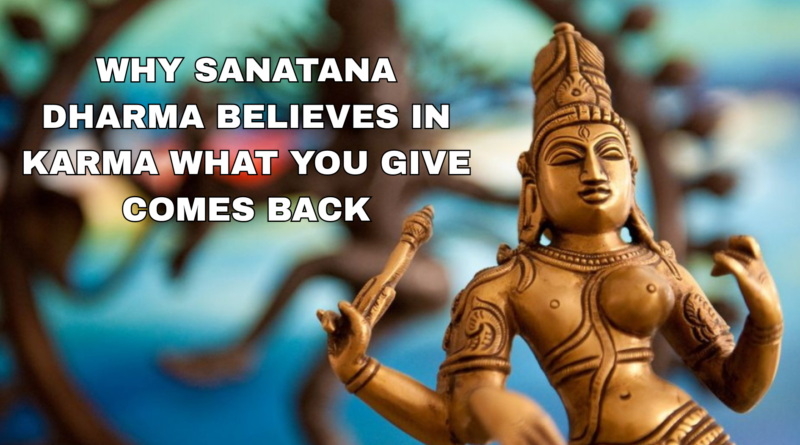WHY SANATANA DHARMA BELIEVES IN KARMA: WHAT YOU GIVE COMES BACK
Sanatana Dharma, also known as Hinduism, is one of the oldest living traditions in the world. It is not just a religion but a way of life that teaches human beings how to live in harmony with themselves, with others, and with nature. One of its most important teachings is the law of karma. The word “karma” simply means “action,” but in Sanatana Dharma, it carries a deeper meaning: every action has consequences. Whatever we do, think, or say creates an energy that will eventually come back to us. This is why people often say, “What you give comes back.”
The Meaning of Karma in Sanatana Dharma
In Sanatana Dharma, karma is not punishment or reward given by a god sitting in judgment. Instead, it is a natural law, just like gravity. If you throw a stone upward, it will fall back. In the same way, if you send out positive or negative actions, they will return to you in some form. This law applies to everyone, regardless of status, wealth, or background. No one can escape the effects of their actions.
The scriptures of Sanatana Dharma, such as the Bhagavad Gita, the Upanishads, and the Vedas, explain that our present life situation is shaped by our past actions, and our future will be shaped by what we do today. Thus, life is like a field, and karma is the seed. If we plant seeds of kindness, love, and honesty, we will harvest happiness and peace. If we plant seeds of anger, greed, and selfishness, we will harvest suffering.
Why Karma Matters in Daily Life
Sanatana Dharma teaches that understanding karma helps people live more responsibly. When we know that our choices have long-term effects, we think twice before hurting others. For example:
If we speak harshly, we create negativity, and people will respond with anger or distance.
If we speak kindly, we spread peace, and people will trust and respect us.
If we cheat or harm others for selfish gain, we may enjoy temporary success, but sooner or later that negativity returns in the form of loss, guilt, or broken relationships.
If we help others, even in small ways, we attract goodness and blessings in our own life.
Thus, karma is not just a spiritual belief but also a guide for ethical living.
The Cycle of Birth and Rebirth
Sanatana Dharma also connects karma with the cycle of birth and rebirth, known as samsara. The soul, or atman, is eternal and takes many births to learn and evolve. The kind of life a soul takes-whether filled with opportunities, challenges, wealth, or struggles-is influenced by past karmas. Good actions in one life may bring peace and joy in the next, while harmful actions may create obstacles.
This belief encourages people to act with awareness, not only for the present life but also for the future. Karma is not about instant results. Sometimes, the effects are delayed, just as seeds take time to grow. This delay teaches patience and faith in the larger cosmic order.
Freedom Through Karma
Although karma determines many aspects of life, Sanatana Dharma does not see it as a prison. Human beings are not completely bound by past actions. We always have the freedom to choose our response in the present. Every new decision can create new karma. This means we can change our destiny by choosing righteousness, or dharma, today.
The Bhagavad Gita teaches that while we cannot control the results of our actions, we can control the actions themselves. Acting with honesty, compassion, and selflessness purifies the mind and creates positive karma. Over time, such actions lead the soul closer to liberation, or moksha, which is freedom from the cycle of rebirth.
Karma and Compassion
The idea of karma also teaches compassion. When we see someone suffering, instead of blaming them for their past actions, Sanatana Dharma encourages us to show kindness. Helping others creates good karma for us and reduces their pain. At the same time, when good things happen to others, we learn to celebrate rather than envy, because we know they are receiving the fruits of their past good actions.
Everyday Examples of Karma
We can see the truth of karma in our daily lives:
A student who studies sincerely will do well in exams, while one who wastes time will struggle.
A person who treats employees with respect builds loyalty, while one who mistreats them creates resentment.
A society that protects nature enjoys balance, while one that destroys it faces floods, droughts, and pollution.
These examples show that karma is not some far-away spiritual law but something practical and visible.
Conclusion: What You Give Comes Back
Sanatana Dharma’s belief in karma is a reminder that life is interconnected. Our thoughts, words, and deeds ripple out into the world and eventually return to us. This law encourages responsibility, kindness, and balance. It teaches us that nothing is wasted—every smile, every act of service, and every choice matters.
By living with awareness of karma, we not only improve our own lives but also contribute to the harmony of society and nature. This is why Sanatana Dharma says: What you give comes back.




